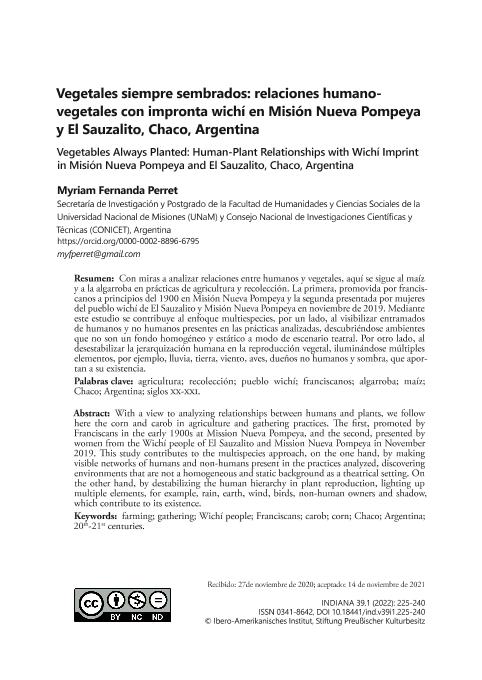Mostrar el registro sencillo del ítem
dc.contributor.author
Perret, Myriam Fernanda

dc.date.available
2023-08-14T12:04:27Z
dc.date.issued
2021-10
dc.identifier.citation
Perret, Myriam Fernanda; Vegetales siempre sembrados: relaciones humano-vegetales en Misión Nueva Pompeya y El Sauzalito, Chaco, Argentina; Ibero-Amerikanisches Institut; Indiana; 39; 1; 10-2021; 1-16
dc.identifier.issn
0341-8642
dc.identifier.uri
http://hdl.handle.net/11336/208064
dc.description.abstract
Con miras a analizar relaciones entre humanos y vegetales, aquí se sigue al maíz y a la algarroba en prácticas de agricultura y recolección. La primera, promovida por franciscanos a principios del 1900 en Misión Nueva Pompeya y la segunda presentada por mujeres del pueblo wichí de El Sauzalito y Misión Nueva Pompeya en noviembre de 2019. Mediante este estudio se contribuye al enfoque multiespecies, por un lado, al visibilizar entramados de humanos y no humanos presentes en las prácticas analizadas, descubriéndose ambientes que no son un fondo homogéneo y estático a modo de escenario teatral. Por otro lado, al desestabilizar la jerarquización humana en la reproducción vegetal, iluminándose múltiples elementos, por ejemplo, lluvia, tierra, viento, aves, dueños no humanos y sombra, que aportan a su existencia.
dc.description.abstract
With a view to analyzing relationships between humans and plants, we follow here the corn and carob in agriculture and gathering practices. The first, promoted by Franciscans in the early 1900s at Mission Nueva Pompeya, and the second, presented by women from the Wichí people of El Sauzalito and Mission Nueva Pompeya in November 2019. This study contributes to the multispecies approach, on the one hand, by making visible networks of humans and non-humans present in the practices analyzed, discovering environments that are not a homogeneous and static background as a theatrical setting. On the other hand, by destabilizing the human hierarchy in plant reproduction, lighting up multiple elements, for example, rain, earth, wind, birds, non-human owners and shadow, which contribute to its existence.
dc.format
application/pdf
dc.language.iso
spa
dc.publisher
Ibero-Amerikanisches Institut
dc.rights
info:eu-repo/semantics/openAccess
dc.rights.uri
https://creativecommons.org/licenses/by-nc-nd/2.5/ar/
dc.subject
Agricultura
dc.subject
Recolección
dc.subject
Pueblo Wichí
dc.subject
Franciscanos
dc.subject
Algarroba
dc.subject.classification
Otras Humanidades

dc.subject.classification
Otras Humanidades

dc.subject.classification
HUMANIDADES

dc.title
Vegetales siempre sembrados: relaciones humano-vegetales en Misión Nueva Pompeya y El Sauzalito, Chaco, Argentina
dc.title
Vegetables Always Planted: Human-Plant Relationships with Wichí Imprint in Misión Nueva Pompeya and El Sauzalito, Chaco, Argentina
dc.type
info:eu-repo/semantics/article
dc.type
info:ar-repo/semantics/artículo
dc.type
info:eu-repo/semantics/publishedVersion
dc.date.updated
2023-08-11T10:46:08Z
dc.identifier.eissn
2365-2225
dc.journal.volume
39
dc.journal.number
1
dc.journal.pagination
1-16
dc.journal.pais
Alemania

dc.journal.ciudad
Berlín
dc.description.fil
Fil: Perret, Myriam Fernanda. Universidad Nacional de Misiones. Facultad de Humanidades y Ciencias Sociales. Secretaría de Investigación y Postgrado; Argentina. Consejo Nacional de Investigaciones Científicas y Técnicas. Centro Científico Tecnológico Conicet - Nordeste; Argentina
dc.journal.title
Indiana
dc.relation.alternativeid
info:eu-repo/semantics/altIdentifier/url/https://journals.iai.spk-berlin.de/index.php/indiana/article/view/2953
Archivos asociados
